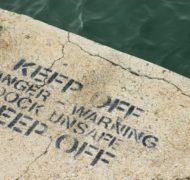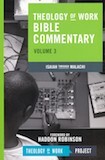An Overview of the Book of Jeremiah
Bible Commentary / Produced by TOW Project
The Book of Jeremiah reflects the ever-worsening situation Jeremiah encountered. At various times, he had the unenviable tasks of challenging the religious hypocrisy, economic dishonesty and oppressive practices of Judah’s leaders and those who followed them. Jeremiah was the voice of warning, the watchman who brings attention to hard truths that others would rather ignore.
Thus says the Lord concerning the house of the king of Judah…I will make you a desert, an uninhabited city. I will prepare destroyers against you….And many nations will pass by this city, and all of them will say one to another, “Why has the Lord dealt in this way with that great city?” And they will answer, “Because they abandoned the covenant of the Lord their God.” (Jer. 22:6-9)
He was the pessimist, who was in reality the realist. He was dismissed and ridiculed by false prophets who insisted that God would never let the city of Jerusalem fall to an invader.
Jeremiah’s persistence in delivering his unwelcome message over four decades is remarkable. He simply would not quit what seemed like an impossible assignment. How many of us would have walked away from such a situation? But one of the striking things about Jeremiah was his tenacious faithfulness in carrying out God’s instructions in the face of unrelenting opposition and harsh criticism. While he has often been called the “weeping prophet” because he mourned the sins of his people and grieved his own lack of success in turning them back to Yahweh, Jeremiah never flinched in his confidence that God, who placed him where he was, would vindicate the truth of his message. The prophet could be faithful to his unwanted call because God had promised to be faithful to him. He served with God’s promise in his pocket: “They will fight against you; but they shall not prevail against you, for I am with you, says the Lord, to deliver you” (Jer. 1:17-19).
In 605, Nebuchadnezzar of Babylon attacked Jerusalem and carried off 10,000 of the most able Jews (including Ezekiel and Daniel). At that point, Jeremiah’s role was expanded to bring God’s word to the Jews in exile (chapter 29). Among the captured Jews were false prophets who assured the exiles that Babylon’s days were numbered and God would never allow Jerusalem to be captured. Jeremiah warned the exiles that they would be in Babylon for seventy years. Instead of acting on false hopes, the Jews there were to settle down in the land, build houses, plant gardens, marry off their children — and stop listening to the false prophets.
Meanwhile, the remaining inhabitants of Judah continued to refuse God’s message. In 586 the Babylonians returned, sacked Jerusalem, pulled down its walls, destroyed its temple stone by stone, and carried off the remaining able-bodied people as captives. Once more, Jeremiah’s role changed (chapters 40-45). God kept him in the destroyed city, now governed briefly by Gedaliah, to encourage the new ruler and help the people understand what had happened and how they were to go forward amid the destruction. Yet once more, despite his plea that they would hear God’s message, they put their faith in an unfortunate military alliance with Egypt that Babylon quickly defeated. Jeremiah was taken to Egypt where he died. To the end, the prophet had to endure the rulers’ stubborn refusal to heed God’s messages and the ruinous outcomes that resulted. Prophets and workplace Christians alike may discover they do not have the ability to overcome every evil. Sometimes success means doing what you know is right even when everything turns out against you.
The final chapters (46-52) deal principally with the judgment God will bring upon all nations, not merely Judah. While God used Babylon against Judah, Babylon would not escape punishment either.
We cannot read Jeremiah without a vivid awareness of the disastrous results of the persistent faithlessness of Judah’s leaders — the kings, the priests and the prophets. Their shortsightedness and willingness to believe the lies they told one another led to the complete destruction of the nation and its capital, Jerusalem. The work God gives us to do is serious business. Failing to follow God’s word in our work can inflict serious damage on ourselves and those around us. Leading the people of Israel was the job of the king, priests and prophets. The national catastrophe that soon engulfed Israel was the direct result of their poor decisions and failure to perform their duties under the Covenant.


.jpg)









